Critical Reflection on Nursing Care: A Patient-Centered Approach
VerifiedAdded on 2023/04/21
|10
|2831
|101
Report
AI Summary
This assignment is a critical reflection on a nursing student's experience caring for an elderly patient with multiple co-morbidities. The reflection utilizes Gibb's cycle to analyze the importance of therapeutic relationships, effective communication, patient education, teamwork, and the handling of ethical dilemmas in healthcare. The student discusses a specific case involving an 80-year-old patient with diabetes, osteoarthritis, and depression, highlighting the challenges of poor teamwork, ethical conflicts between autonomy and beneficence, and the positive impact of effective communication and patient education on patient satisfaction and outcomes. The report evaluates the experience, identifying strengths and weaknesses in handling ethical situations and teamwork, and analyzes the impact of health literacy, therapeutic relationships, and communication on patient care. The conclusion emphasizes the need for improved communication, teamwork, patient education, and ethical decision-making in future nursing practice to ensure quality patient care.
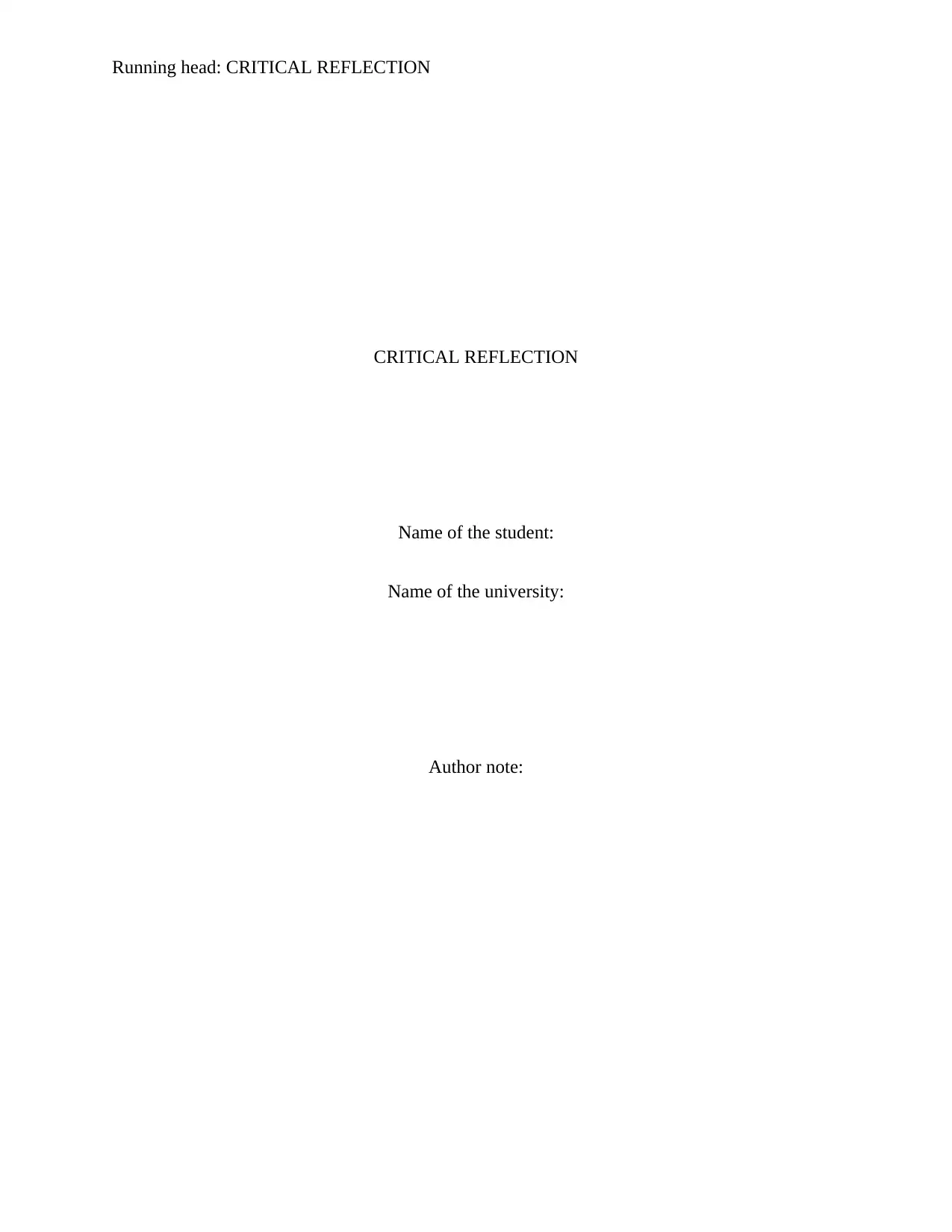
Running head: CRITICAL REFLECTION
CRITICAL REFLECTION
Name of the student:
Name of the university:
Author note:
CRITICAL REFLECTION
Name of the student:
Name of the university:
Author note:
Paraphrase This Document
Need a fresh take? Get an instant paraphrase of this document with our AI Paraphraser
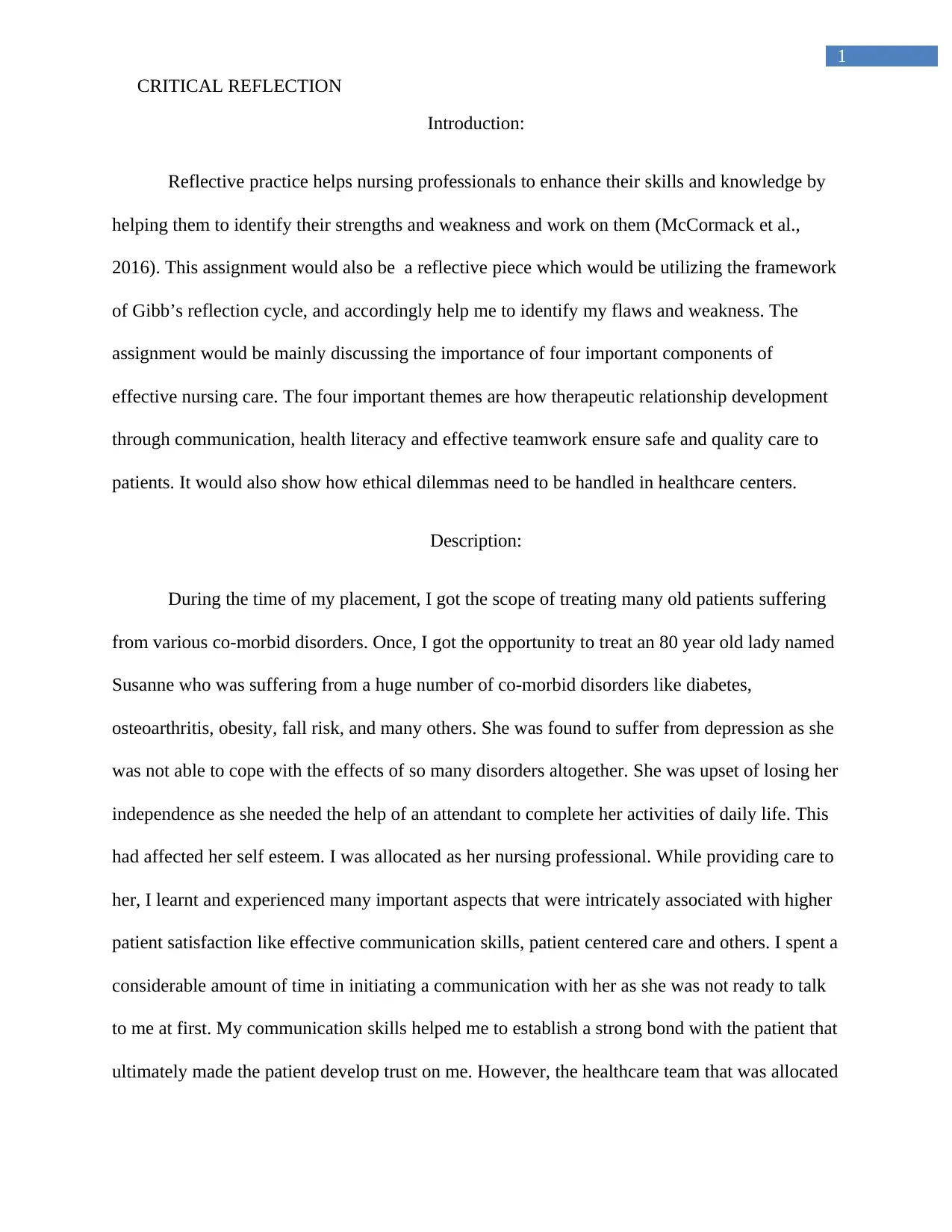
1
CRITICAL REFLECTION
Introduction:
Reflective practice helps nursing professionals to enhance their skills and knowledge by
helping them to identify their strengths and weakness and work on them (McCormack et al.,
2016). This assignment would also be a reflective piece which would be utilizing the framework
of Gibb’s reflection cycle, and accordingly help me to identify my flaws and weakness. The
assignment would be mainly discussing the importance of four important components of
effective nursing care. The four important themes are how therapeutic relationship development
through communication, health literacy and effective teamwork ensure safe and quality care to
patients. It would also show how ethical dilemmas need to be handled in healthcare centers.
Description:
During the time of my placement, I got the scope of treating many old patients suffering
from various co-morbid disorders. Once, I got the opportunity to treat an 80 year old lady named
Susanne who was suffering from a huge number of co-morbid disorders like diabetes,
osteoarthritis, obesity, fall risk, and many others. She was found to suffer from depression as she
was not able to cope with the effects of so many disorders altogether. She was upset of losing her
independence as she needed the help of an attendant to complete her activities of daily life. This
had affected her self esteem. I was allocated as her nursing professional. While providing care to
her, I learnt and experienced many important aspects that were intricately associated with higher
patient satisfaction like effective communication skills, patient centered care and others. I spent a
considerable amount of time in initiating a communication with her as she was not ready to talk
to me at first. My communication skills helped me to establish a strong bond with the patient that
ultimately made the patient develop trust on me. However, the healthcare team that was allocated
CRITICAL REFLECTION
Introduction:
Reflective practice helps nursing professionals to enhance their skills and knowledge by
helping them to identify their strengths and weakness and work on them (McCormack et al.,
2016). This assignment would also be a reflective piece which would be utilizing the framework
of Gibb’s reflection cycle, and accordingly help me to identify my flaws and weakness. The
assignment would be mainly discussing the importance of four important components of
effective nursing care. The four important themes are how therapeutic relationship development
through communication, health literacy and effective teamwork ensure safe and quality care to
patients. It would also show how ethical dilemmas need to be handled in healthcare centers.
Description:
During the time of my placement, I got the scope of treating many old patients suffering
from various co-morbid disorders. Once, I got the opportunity to treat an 80 year old lady named
Susanne who was suffering from a huge number of co-morbid disorders like diabetes,
osteoarthritis, obesity, fall risk, and many others. She was found to suffer from depression as she
was not able to cope with the effects of so many disorders altogether. She was upset of losing her
independence as she needed the help of an attendant to complete her activities of daily life. This
had affected her self esteem. I was allocated as her nursing professional. While providing care to
her, I learnt and experienced many important aspects that were intricately associated with higher
patient satisfaction like effective communication skills, patient centered care and others. I spent a
considerable amount of time in initiating a communication with her as she was not ready to talk
to me at first. My communication skills helped me to establish a strong bond with the patient that
ultimately made the patient develop trust on me. However, the healthcare team that was allocated
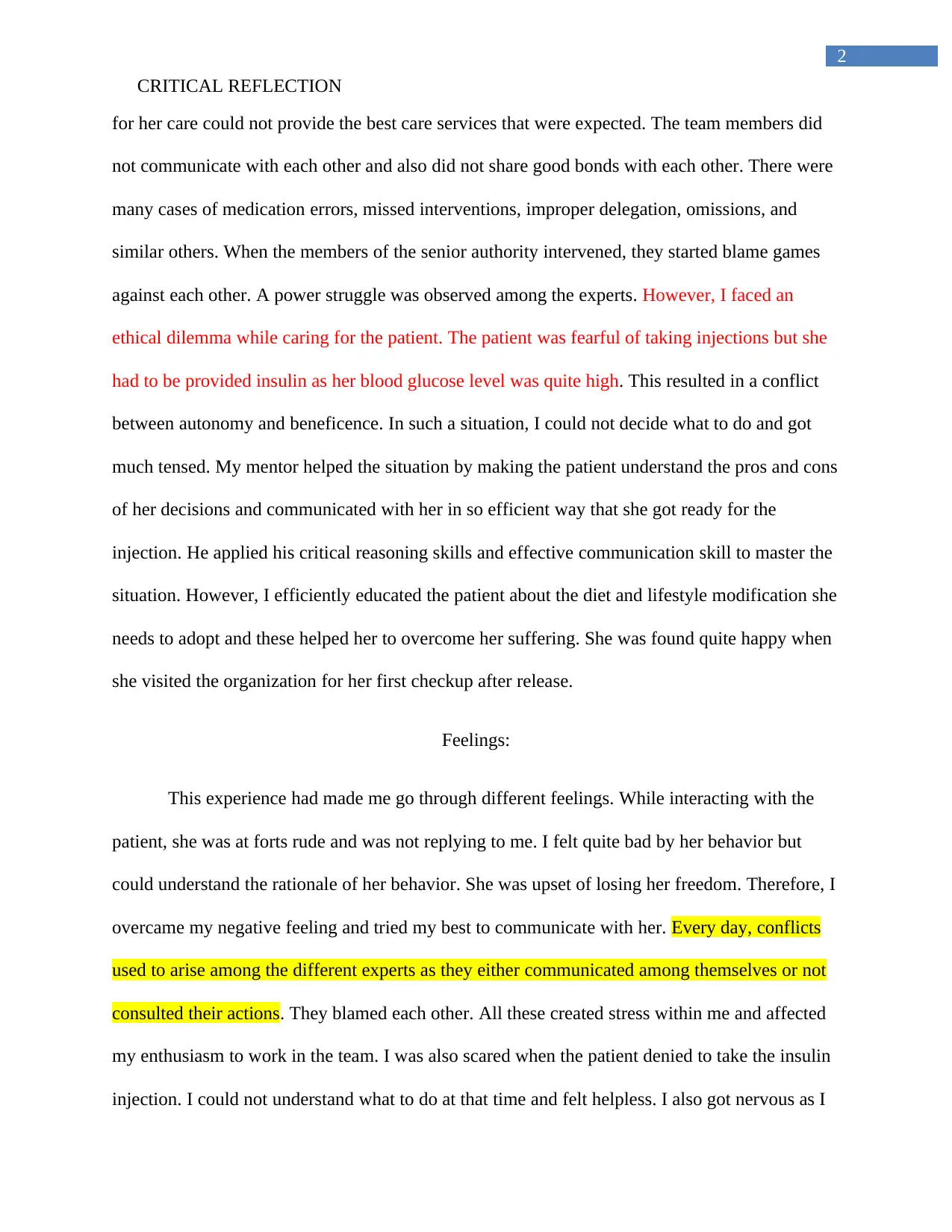
2
CRITICAL REFLECTION
for her care could not provide the best care services that were expected. The team members did
not communicate with each other and also did not share good bonds with each other. There were
many cases of medication errors, missed interventions, improper delegation, omissions, and
similar others. When the members of the senior authority intervened, they started blame games
against each other. A power struggle was observed among the experts. However, I faced an
ethical dilemma while caring for the patient. The patient was fearful of taking injections but she
had to be provided insulin as her blood glucose level was quite high. This resulted in a conflict
between autonomy and beneficence. In such a situation, I could not decide what to do and got
much tensed. My mentor helped the situation by making the patient understand the pros and cons
of her decisions and communicated with her in so efficient way that she got ready for the
injection. He applied his critical reasoning skills and effective communication skill to master the
situation. However, I efficiently educated the patient about the diet and lifestyle modification she
needs to adopt and these helped her to overcome her suffering. She was found quite happy when
she visited the organization for her first checkup after release.
Feelings:
This experience had made me go through different feelings. While interacting with the
patient, she was at forts rude and was not replying to me. I felt quite bad by her behavior but
could understand the rationale of her behavior. She was upset of losing her freedom. Therefore, I
overcame my negative feeling and tried my best to communicate with her. Every day, conflicts
used to arise among the different experts as they either communicated among themselves or not
consulted their actions. They blamed each other. All these created stress within me and affected
my enthusiasm to work in the team. I was also scared when the patient denied to take the insulin
injection. I could not understand what to do at that time and felt helpless. I also got nervous as I
CRITICAL REFLECTION
for her care could not provide the best care services that were expected. The team members did
not communicate with each other and also did not share good bonds with each other. There were
many cases of medication errors, missed interventions, improper delegation, omissions, and
similar others. When the members of the senior authority intervened, they started blame games
against each other. A power struggle was observed among the experts. However, I faced an
ethical dilemma while caring for the patient. The patient was fearful of taking injections but she
had to be provided insulin as her blood glucose level was quite high. This resulted in a conflict
between autonomy and beneficence. In such a situation, I could not decide what to do and got
much tensed. My mentor helped the situation by making the patient understand the pros and cons
of her decisions and communicated with her in so efficient way that she got ready for the
injection. He applied his critical reasoning skills and effective communication skill to master the
situation. However, I efficiently educated the patient about the diet and lifestyle modification she
needs to adopt and these helped her to overcome her suffering. She was found quite happy when
she visited the organization for her first checkup after release.
Feelings:
This experience had made me go through different feelings. While interacting with the
patient, she was at forts rude and was not replying to me. I felt quite bad by her behavior but
could understand the rationale of her behavior. She was upset of losing her freedom. Therefore, I
overcame my negative feeling and tried my best to communicate with her. Every day, conflicts
used to arise among the different experts as they either communicated among themselves or not
consulted their actions. They blamed each other. All these created stress within me and affected
my enthusiasm to work in the team. I was also scared when the patient denied to take the insulin
injection. I could not understand what to do at that time and felt helpless. I also got nervous as I
⊘ This is a preview!⊘
Do you want full access?
Subscribe today to unlock all pages.

Trusted by 1+ million students worldwide
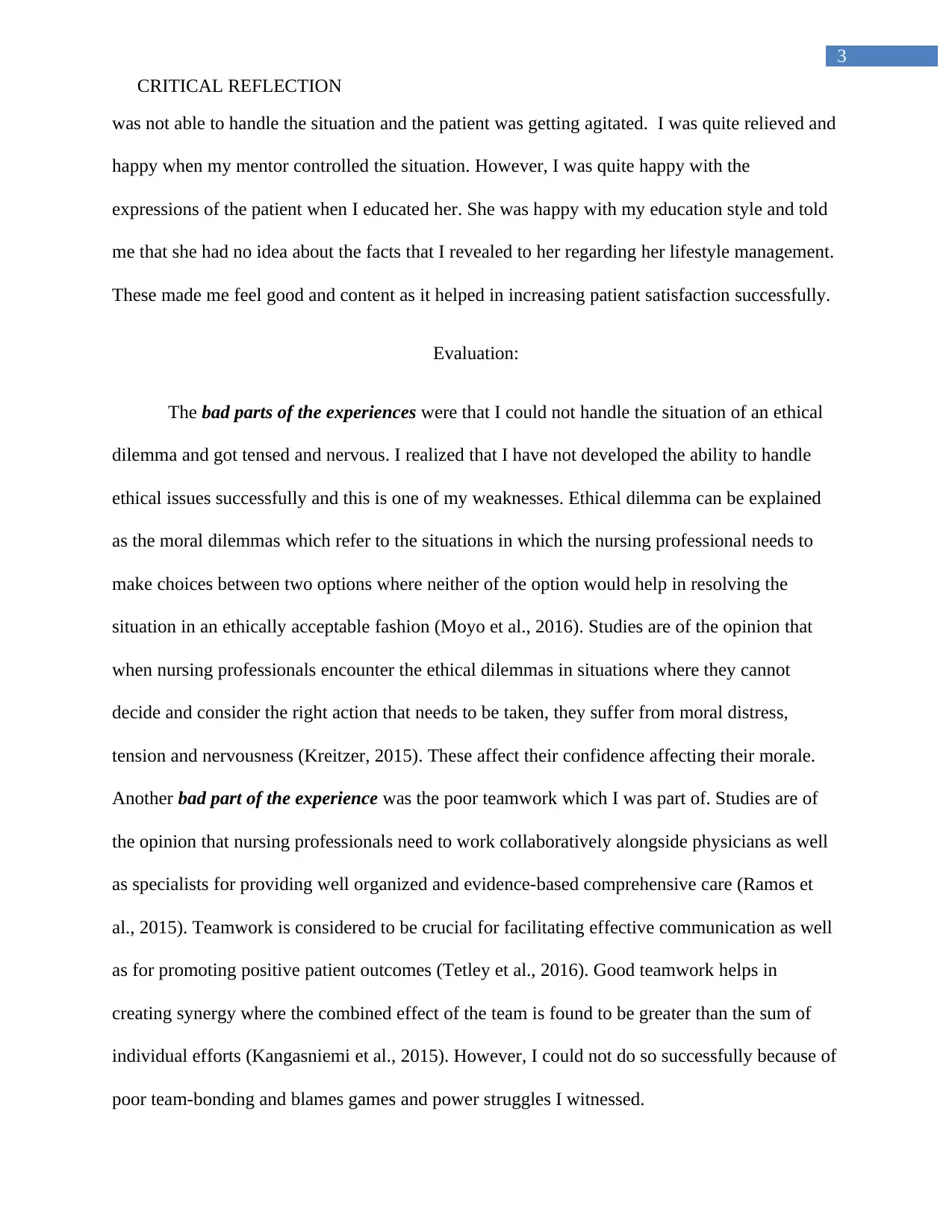
3
CRITICAL REFLECTION
was not able to handle the situation and the patient was getting agitated. I was quite relieved and
happy when my mentor controlled the situation. However, I was quite happy with the
expressions of the patient when I educated her. She was happy with my education style and told
me that she had no idea about the facts that I revealed to her regarding her lifestyle management.
These made me feel good and content as it helped in increasing patient satisfaction successfully.
Evaluation:
The bad parts of the experiences were that I could not handle the situation of an ethical
dilemma and got tensed and nervous. I realized that I have not developed the ability to handle
ethical issues successfully and this is one of my weaknesses. Ethical dilemma can be explained
as the moral dilemmas which refer to the situations in which the nursing professional needs to
make choices between two options where neither of the option would help in resolving the
situation in an ethically acceptable fashion (Moyo et al., 2016). Studies are of the opinion that
when nursing professionals encounter the ethical dilemmas in situations where they cannot
decide and consider the right action that needs to be taken, they suffer from moral distress,
tension and nervousness (Kreitzer, 2015). These affect their confidence affecting their morale.
Another bad part of the experience was the poor teamwork which I was part of. Studies are of
the opinion that nursing professionals need to work collaboratively alongside physicians as well
as specialists for providing well organized and evidence-based comprehensive care (Ramos et
al., 2015). Teamwork is considered to be crucial for facilitating effective communication as well
as for promoting positive patient outcomes (Tetley et al., 2016). Good teamwork helps in
creating synergy where the combined effect of the team is found to be greater than the sum of
individual efforts (Kangasniemi et al., 2015). However, I could not do so successfully because of
poor team-bonding and blames games and power struggles I witnessed.
CRITICAL REFLECTION
was not able to handle the situation and the patient was getting agitated. I was quite relieved and
happy when my mentor controlled the situation. However, I was quite happy with the
expressions of the patient when I educated her. She was happy with my education style and told
me that she had no idea about the facts that I revealed to her regarding her lifestyle management.
These made me feel good and content as it helped in increasing patient satisfaction successfully.
Evaluation:
The bad parts of the experiences were that I could not handle the situation of an ethical
dilemma and got tensed and nervous. I realized that I have not developed the ability to handle
ethical issues successfully and this is one of my weaknesses. Ethical dilemma can be explained
as the moral dilemmas which refer to the situations in which the nursing professional needs to
make choices between two options where neither of the option would help in resolving the
situation in an ethically acceptable fashion (Moyo et al., 2016). Studies are of the opinion that
when nursing professionals encounter the ethical dilemmas in situations where they cannot
decide and consider the right action that needs to be taken, they suffer from moral distress,
tension and nervousness (Kreitzer, 2015). These affect their confidence affecting their morale.
Another bad part of the experience was the poor teamwork which I was part of. Studies are of
the opinion that nursing professionals need to work collaboratively alongside physicians as well
as specialists for providing well organized and evidence-based comprehensive care (Ramos et
al., 2015). Teamwork is considered to be crucial for facilitating effective communication as well
as for promoting positive patient outcomes (Tetley et al., 2016). Good teamwork helps in
creating synergy where the combined effect of the team is found to be greater than the sum of
individual efforts (Kangasniemi et al., 2015). However, I could not do so successfully because of
poor team-bonding and blames games and power struggles I witnessed.
Paraphrase This Document
Need a fresh take? Get an instant paraphrase of this document with our AI Paraphraser
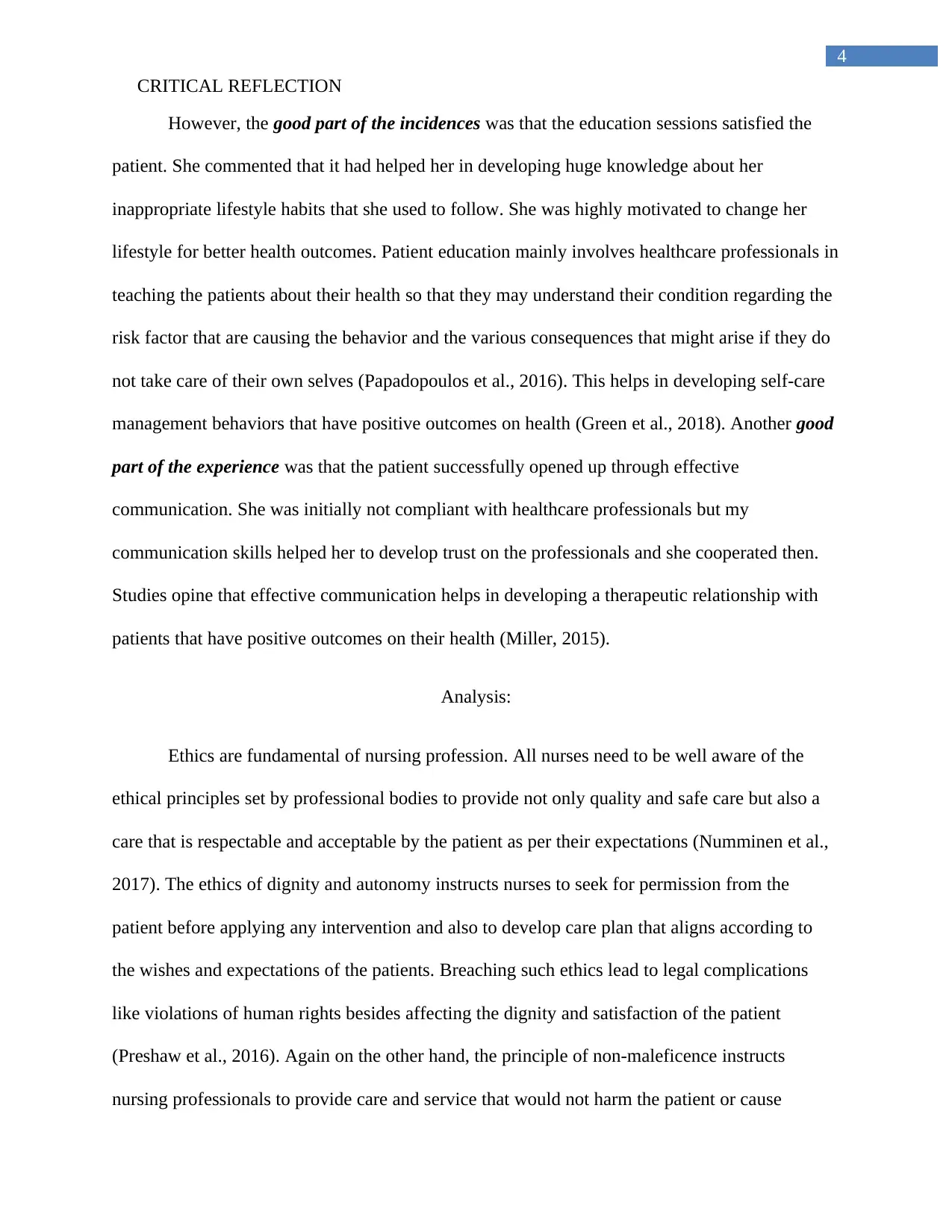
4
CRITICAL REFLECTION
However, the good part of the incidences was that the education sessions satisfied the
patient. She commented that it had helped her in developing huge knowledge about her
inappropriate lifestyle habits that she used to follow. She was highly motivated to change her
lifestyle for better health outcomes. Patient education mainly involves healthcare professionals in
teaching the patients about their health so that they may understand their condition regarding the
risk factor that are causing the behavior and the various consequences that might arise if they do
not take care of their own selves (Papadopoulos et al., 2016). This helps in developing self-care
management behaviors that have positive outcomes on health (Green et al., 2018). Another good
part of the experience was that the patient successfully opened up through effective
communication. She was initially not compliant with healthcare professionals but my
communication skills helped her to develop trust on the professionals and she cooperated then.
Studies opine that effective communication helps in developing a therapeutic relationship with
patients that have positive outcomes on their health (Miller, 2015).
Analysis:
Ethics are fundamental of nursing profession. All nurses need to be well aware of the
ethical principles set by professional bodies to provide not only quality and safe care but also a
care that is respectable and acceptable by the patient as per their expectations (Numminen et al.,
2017). The ethics of dignity and autonomy instructs nurses to seek for permission from the
patient before applying any intervention and also to develop care plan that aligns according to
the wishes and expectations of the patients. Breaching such ethics lead to legal complications
like violations of human rights besides affecting the dignity and satisfaction of the patient
(Preshaw et al., 2016). Again on the other hand, the principle of non-maleficence instructs
nursing professionals to provide care and service that would not harm the patient or cause
CRITICAL REFLECTION
However, the good part of the incidences was that the education sessions satisfied the
patient. She commented that it had helped her in developing huge knowledge about her
inappropriate lifestyle habits that she used to follow. She was highly motivated to change her
lifestyle for better health outcomes. Patient education mainly involves healthcare professionals in
teaching the patients about their health so that they may understand their condition regarding the
risk factor that are causing the behavior and the various consequences that might arise if they do
not take care of their own selves (Papadopoulos et al., 2016). This helps in developing self-care
management behaviors that have positive outcomes on health (Green et al., 2018). Another good
part of the experience was that the patient successfully opened up through effective
communication. She was initially not compliant with healthcare professionals but my
communication skills helped her to develop trust on the professionals and she cooperated then.
Studies opine that effective communication helps in developing a therapeutic relationship with
patients that have positive outcomes on their health (Miller, 2015).
Analysis:
Ethics are fundamental of nursing profession. All nurses need to be well aware of the
ethical principles set by professional bodies to provide not only quality and safe care but also a
care that is respectable and acceptable by the patient as per their expectations (Numminen et al.,
2017). The ethics of dignity and autonomy instructs nurses to seek for permission from the
patient before applying any intervention and also to develop care plan that aligns according to
the wishes and expectations of the patients. Breaching such ethics lead to legal complications
like violations of human rights besides affecting the dignity and satisfaction of the patient
(Preshaw et al., 2016). Again on the other hand, the principle of non-maleficence instructs
nursing professionals to provide care and service that would not harm the patient or cause
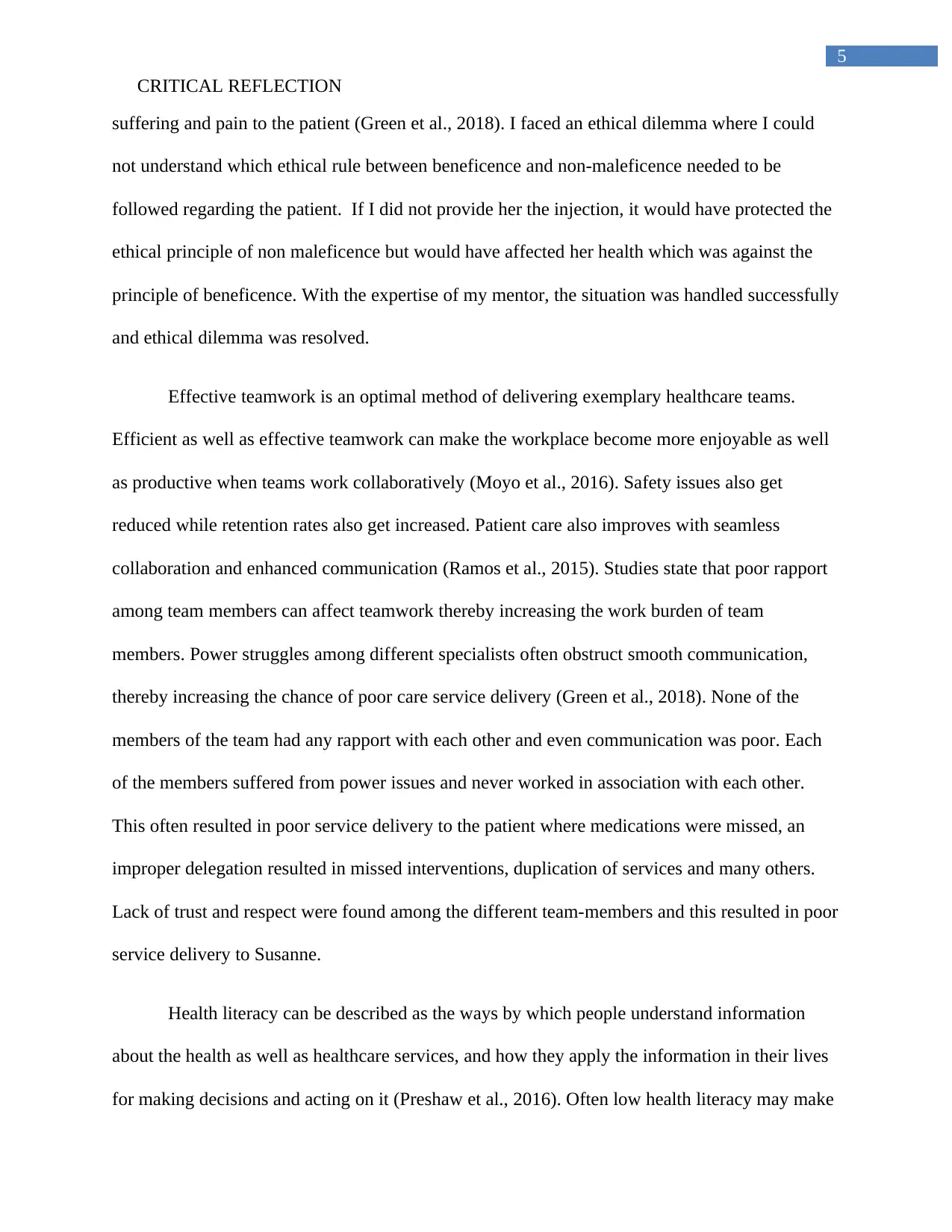
5
CRITICAL REFLECTION
suffering and pain to the patient (Green et al., 2018). I faced an ethical dilemma where I could
not understand which ethical rule between beneficence and non-maleficence needed to be
followed regarding the patient. If I did not provide her the injection, it would have protected the
ethical principle of non maleficence but would have affected her health which was against the
principle of beneficence. With the expertise of my mentor, the situation was handled successfully
and ethical dilemma was resolved.
Effective teamwork is an optimal method of delivering exemplary healthcare teams.
Efficient as well as effective teamwork can make the workplace become more enjoyable as well
as productive when teams work collaboratively (Moyo et al., 2016). Safety issues also get
reduced while retention rates also get increased. Patient care also improves with seamless
collaboration and enhanced communication (Ramos et al., 2015). Studies state that poor rapport
among team members can affect teamwork thereby increasing the work burden of team
members. Power struggles among different specialists often obstruct smooth communication,
thereby increasing the chance of poor care service delivery (Green et al., 2018). None of the
members of the team had any rapport with each other and even communication was poor. Each
of the members suffered from power issues and never worked in association with each other.
This often resulted in poor service delivery to the patient where medications were missed, an
improper delegation resulted in missed interventions, duplication of services and many others.
Lack of trust and respect were found among the different team-members and this resulted in poor
service delivery to Susanne.
Health literacy can be described as the ways by which people understand information
about the health as well as healthcare services, and how they apply the information in their lives
for making decisions and acting on it (Preshaw et al., 2016). Often low health literacy may make
CRITICAL REFLECTION
suffering and pain to the patient (Green et al., 2018). I faced an ethical dilemma where I could
not understand which ethical rule between beneficence and non-maleficence needed to be
followed regarding the patient. If I did not provide her the injection, it would have protected the
ethical principle of non maleficence but would have affected her health which was against the
principle of beneficence. With the expertise of my mentor, the situation was handled successfully
and ethical dilemma was resolved.
Effective teamwork is an optimal method of delivering exemplary healthcare teams.
Efficient as well as effective teamwork can make the workplace become more enjoyable as well
as productive when teams work collaboratively (Moyo et al., 2016). Safety issues also get
reduced while retention rates also get increased. Patient care also improves with seamless
collaboration and enhanced communication (Ramos et al., 2015). Studies state that poor rapport
among team members can affect teamwork thereby increasing the work burden of team
members. Power struggles among different specialists often obstruct smooth communication,
thereby increasing the chance of poor care service delivery (Green et al., 2018). None of the
members of the team had any rapport with each other and even communication was poor. Each
of the members suffered from power issues and never worked in association with each other.
This often resulted in poor service delivery to the patient where medications were missed, an
improper delegation resulted in missed interventions, duplication of services and many others.
Lack of trust and respect were found among the different team-members and this resulted in poor
service delivery to Susanne.
Health literacy can be described as the ways by which people understand information
about the health as well as healthcare services, and how they apply the information in their lives
for making decisions and acting on it (Preshaw et al., 2016). Often low health literacy may make
⊘ This is a preview!⊘
Do you want full access?
Subscribe today to unlock all pages.

Trusted by 1+ million students worldwide
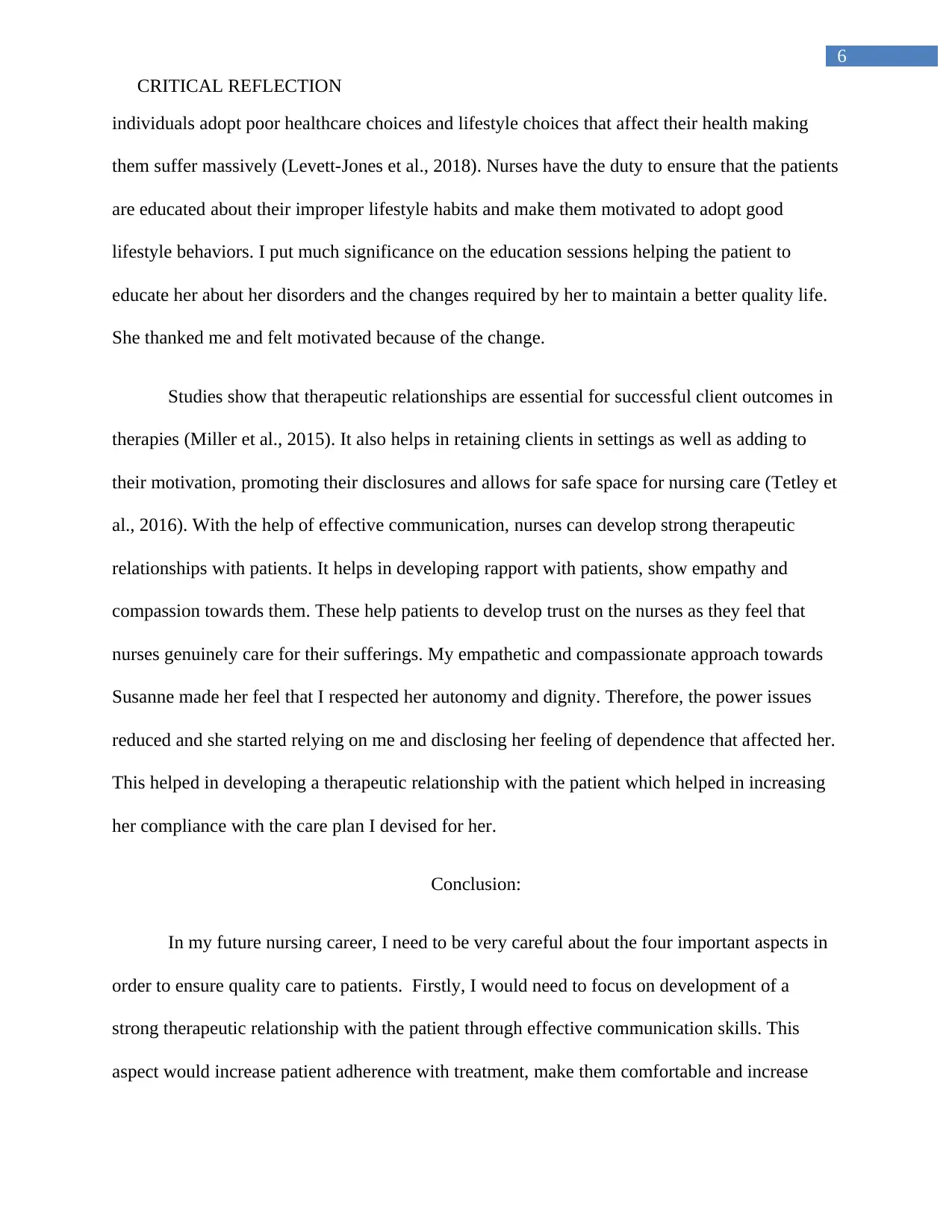
6
CRITICAL REFLECTION
individuals adopt poor healthcare choices and lifestyle choices that affect their health making
them suffer massively (Levett-Jones et al., 2018). Nurses have the duty to ensure that the patients
are educated about their improper lifestyle habits and make them motivated to adopt good
lifestyle behaviors. I put much significance on the education sessions helping the patient to
educate her about her disorders and the changes required by her to maintain a better quality life.
She thanked me and felt motivated because of the change.
Studies show that therapeutic relationships are essential for successful client outcomes in
therapies (Miller et al., 2015). It also helps in retaining clients in settings as well as adding to
their motivation, promoting their disclosures and allows for safe space for nursing care (Tetley et
al., 2016). With the help of effective communication, nurses can develop strong therapeutic
relationships with patients. It helps in developing rapport with patients, show empathy and
compassion towards them. These help patients to develop trust on the nurses as they feel that
nurses genuinely care for their sufferings. My empathetic and compassionate approach towards
Susanne made her feel that I respected her autonomy and dignity. Therefore, the power issues
reduced and she started relying on me and disclosing her feeling of dependence that affected her.
This helped in developing a therapeutic relationship with the patient which helped in increasing
her compliance with the care plan I devised for her.
Conclusion:
In my future nursing career, I need to be very careful about the four important aspects in
order to ensure quality care to patients. Firstly, I would need to focus on development of a
strong therapeutic relationship with the patient through effective communication skills. This
aspect would increase patient adherence with treatment, make them comfortable and increase
CRITICAL REFLECTION
individuals adopt poor healthcare choices and lifestyle choices that affect their health making
them suffer massively (Levett-Jones et al., 2018). Nurses have the duty to ensure that the patients
are educated about their improper lifestyle habits and make them motivated to adopt good
lifestyle behaviors. I put much significance on the education sessions helping the patient to
educate her about her disorders and the changes required by her to maintain a better quality life.
She thanked me and felt motivated because of the change.
Studies show that therapeutic relationships are essential for successful client outcomes in
therapies (Miller et al., 2015). It also helps in retaining clients in settings as well as adding to
their motivation, promoting their disclosures and allows for safe space for nursing care (Tetley et
al., 2016). With the help of effective communication, nurses can develop strong therapeutic
relationships with patients. It helps in developing rapport with patients, show empathy and
compassion towards them. These help patients to develop trust on the nurses as they feel that
nurses genuinely care for their sufferings. My empathetic and compassionate approach towards
Susanne made her feel that I respected her autonomy and dignity. Therefore, the power issues
reduced and she started relying on me and disclosing her feeling of dependence that affected her.
This helped in developing a therapeutic relationship with the patient which helped in increasing
her compliance with the care plan I devised for her.
Conclusion:
In my future nursing career, I need to be very careful about the four important aspects in
order to ensure quality care to patients. Firstly, I would need to focus on development of a
strong therapeutic relationship with the patient through effective communication skills. This
aspect would increase patient adherence with treatment, make them comfortable and increase
Paraphrase This Document
Need a fresh take? Get an instant paraphrase of this document with our AI Paraphraser
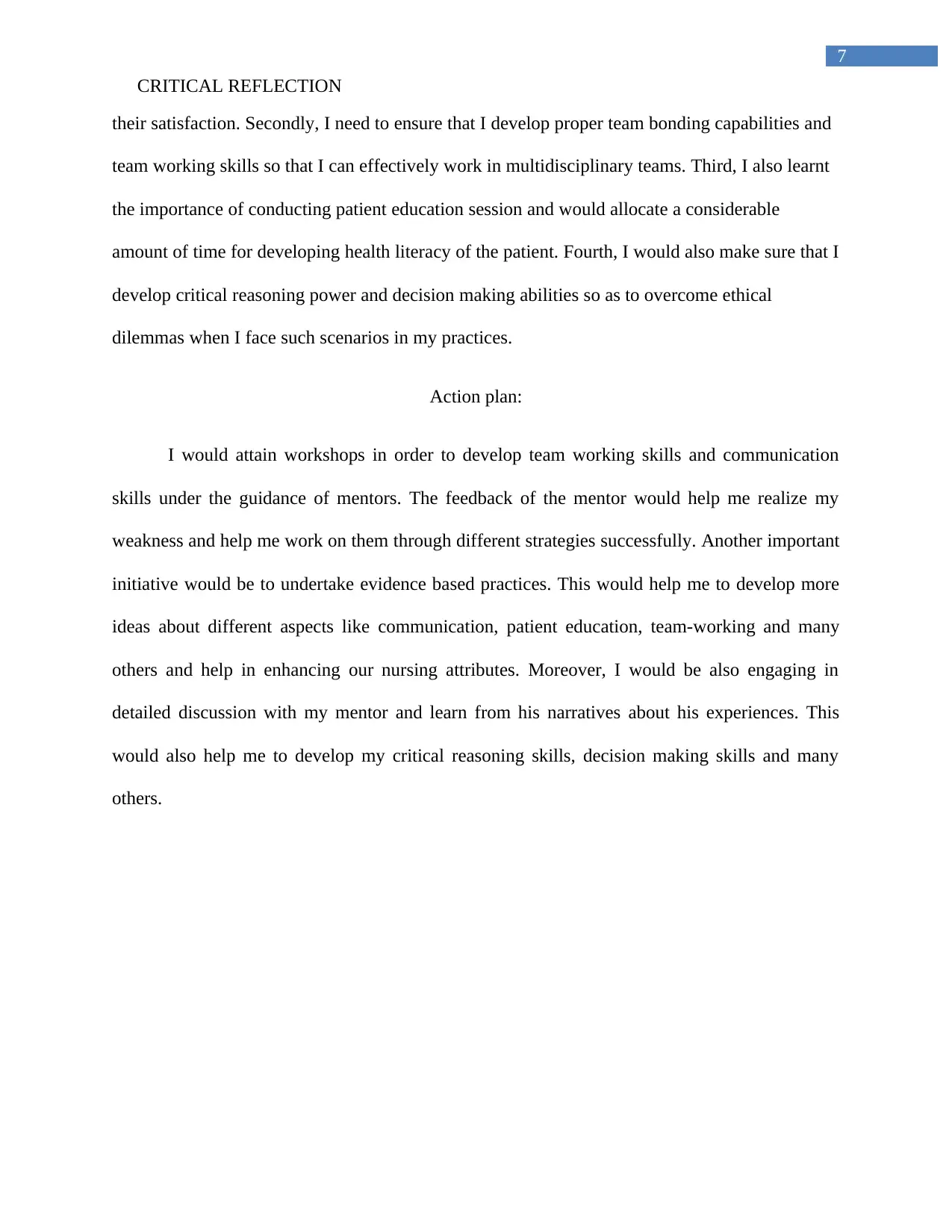
7
CRITICAL REFLECTION
their satisfaction. Secondly, I need to ensure that I develop proper team bonding capabilities and
team working skills so that I can effectively work in multidisciplinary teams. Third, I also learnt
the importance of conducting patient education session and would allocate a considerable
amount of time for developing health literacy of the patient. Fourth, I would also make sure that I
develop critical reasoning power and decision making abilities so as to overcome ethical
dilemmas when I face such scenarios in my practices.
Action plan:
I would attain workshops in order to develop team working skills and communication
skills under the guidance of mentors. The feedback of the mentor would help me realize my
weakness and help me work on them through different strategies successfully. Another important
initiative would be to undertake evidence based practices. This would help me to develop more
ideas about different aspects like communication, patient education, team-working and many
others and help in enhancing our nursing attributes. Moreover, I would be also engaging in
detailed discussion with my mentor and learn from his narratives about his experiences. This
would also help me to develop my critical reasoning skills, decision making skills and many
others.
CRITICAL REFLECTION
their satisfaction. Secondly, I need to ensure that I develop proper team bonding capabilities and
team working skills so that I can effectively work in multidisciplinary teams. Third, I also learnt
the importance of conducting patient education session and would allocate a considerable
amount of time for developing health literacy of the patient. Fourth, I would also make sure that I
develop critical reasoning power and decision making abilities so as to overcome ethical
dilemmas when I face such scenarios in my practices.
Action plan:
I would attain workshops in order to develop team working skills and communication
skills under the guidance of mentors. The feedback of the mentor would help me realize my
weakness and help me work on them through different strategies successfully. Another important
initiative would be to undertake evidence based practices. This would help me to develop more
ideas about different aspects like communication, patient education, team-working and many
others and help in enhancing our nursing attributes. Moreover, I would be also engaging in
detailed discussion with my mentor and learn from his narratives about his experiences. This
would also help me to develop my critical reasoning skills, decision making skills and many
others.
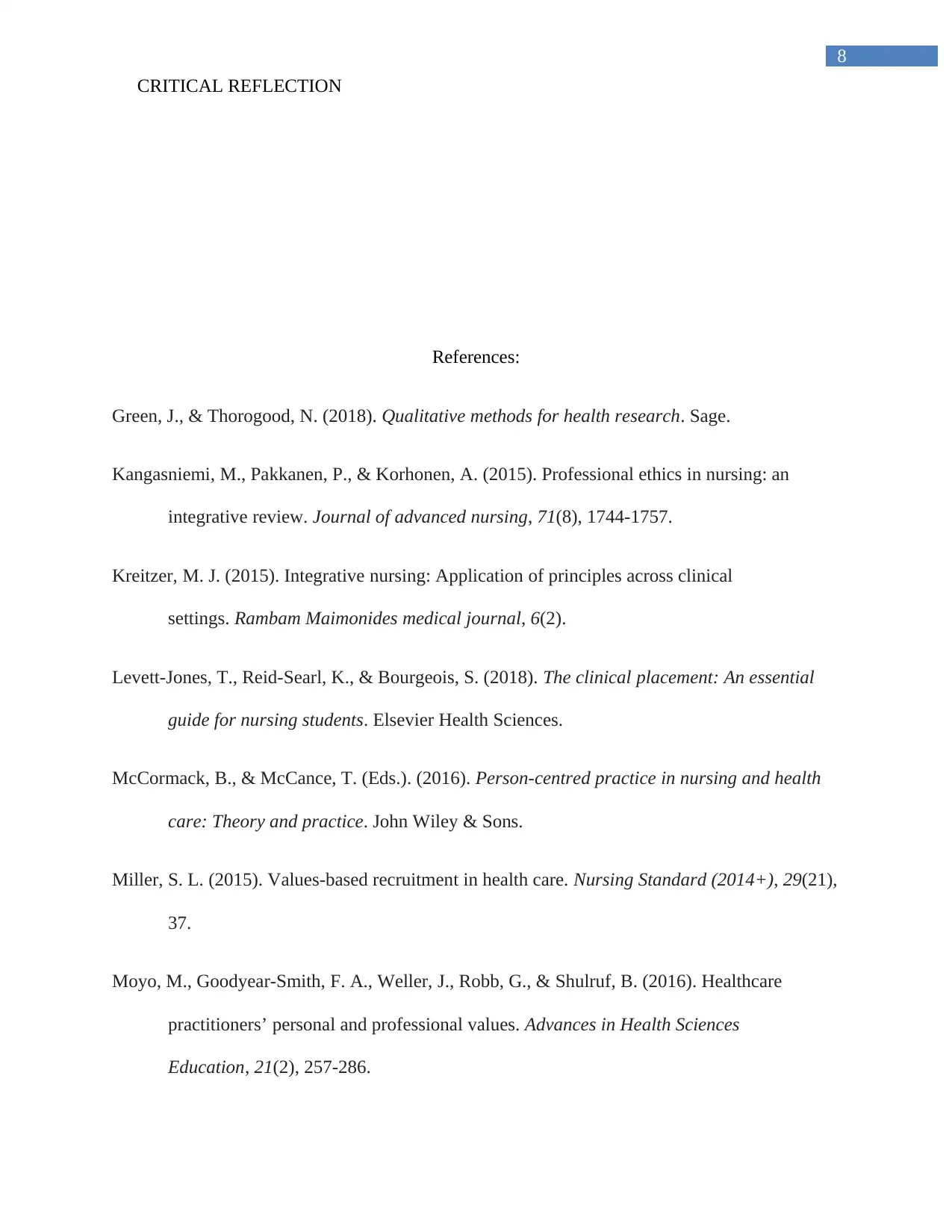
8
CRITICAL REFLECTION
References:
Green, J., & Thorogood, N. (2018). Qualitative methods for health research. Sage.
Kangasniemi, M., Pakkanen, P., & Korhonen, A. (2015). Professional ethics in nursing: an
integrative review. Journal of advanced nursing, 71(8), 1744-1757.
Kreitzer, M. J. (2015). Integrative nursing: Application of principles across clinical
settings. Rambam Maimonides medical journal, 6(2).
Levett-Jones, T., Reid-Searl, K., & Bourgeois, S. (2018). The clinical placement: An essential
guide for nursing students. Elsevier Health Sciences.
McCormack, B., & McCance, T. (Eds.). (2016). Person-centred practice in nursing and health
care: Theory and practice. John Wiley & Sons.
Miller, S. L. (2015). Values-based recruitment in health care. Nursing Standard (2014+), 29(21),
37.
Moyo, M., Goodyear-Smith, F. A., Weller, J., Robb, G., & Shulruf, B. (2016). Healthcare
practitioners’ personal and professional values. Advances in Health Sciences
Education, 21(2), 257-286.
CRITICAL REFLECTION
References:
Green, J., & Thorogood, N. (2018). Qualitative methods for health research. Sage.
Kangasniemi, M., Pakkanen, P., & Korhonen, A. (2015). Professional ethics in nursing: an
integrative review. Journal of advanced nursing, 71(8), 1744-1757.
Kreitzer, M. J. (2015). Integrative nursing: Application of principles across clinical
settings. Rambam Maimonides medical journal, 6(2).
Levett-Jones, T., Reid-Searl, K., & Bourgeois, S. (2018). The clinical placement: An essential
guide for nursing students. Elsevier Health Sciences.
McCormack, B., & McCance, T. (Eds.). (2016). Person-centred practice in nursing and health
care: Theory and practice. John Wiley & Sons.
Miller, S. L. (2015). Values-based recruitment in health care. Nursing Standard (2014+), 29(21),
37.
Moyo, M., Goodyear-Smith, F. A., Weller, J., Robb, G., & Shulruf, B. (2016). Healthcare
practitioners’ personal and professional values. Advances in Health Sciences
Education, 21(2), 257-286.
⊘ This is a preview!⊘
Do you want full access?
Subscribe today to unlock all pages.

Trusted by 1+ million students worldwide
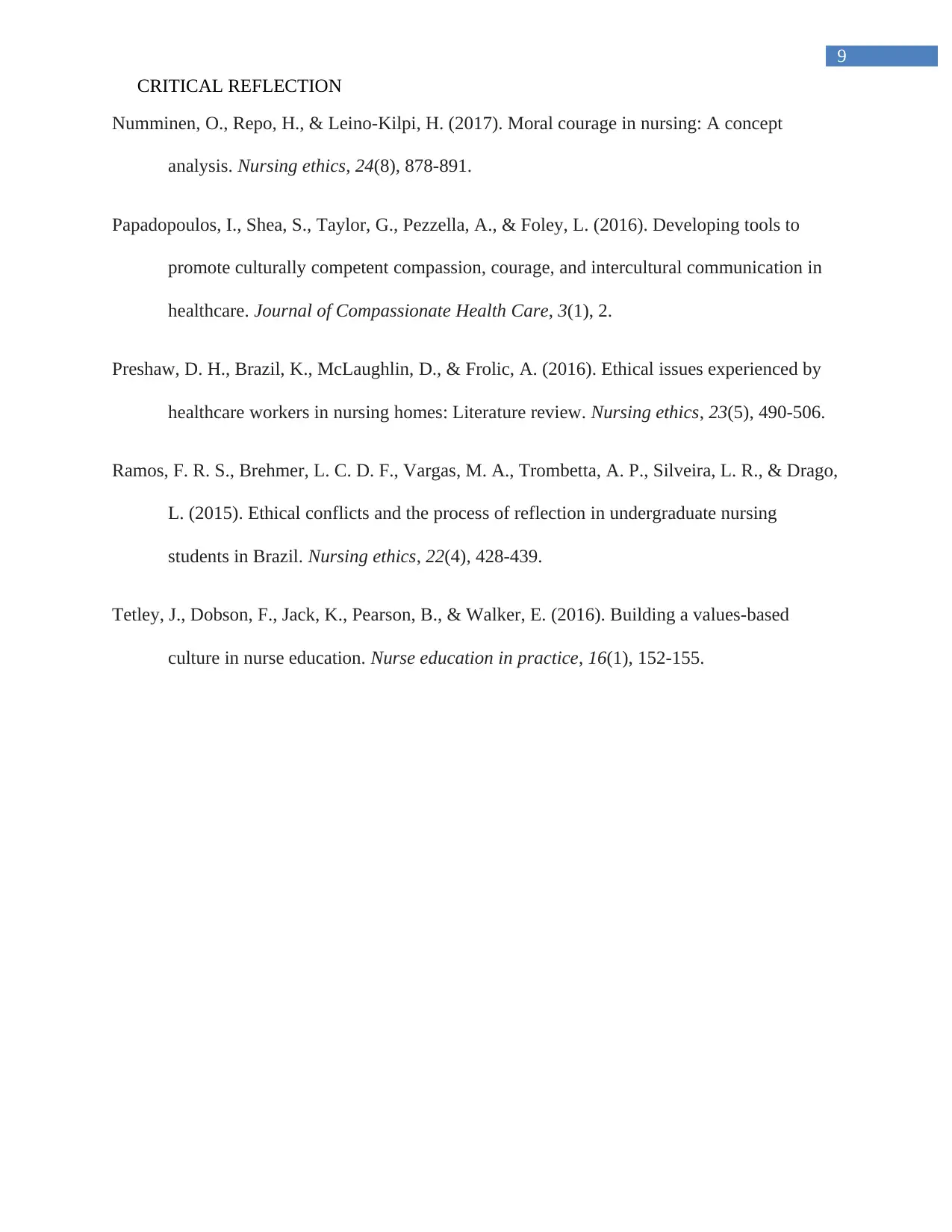
9
CRITICAL REFLECTION
Numminen, O., Repo, H., & Leino-Kilpi, H. (2017). Moral courage in nursing: A concept
analysis. Nursing ethics, 24(8), 878-891.
Papadopoulos, I., Shea, S., Taylor, G., Pezzella, A., & Foley, L. (2016). Developing tools to
promote culturally competent compassion, courage, and intercultural communication in
healthcare. Journal of Compassionate Health Care, 3(1), 2.
Preshaw, D. H., Brazil, K., McLaughlin, D., & Frolic, A. (2016). Ethical issues experienced by
healthcare workers in nursing homes: Literature review. Nursing ethics, 23(5), 490-506.
Ramos, F. R. S., Brehmer, L. C. D. F., Vargas, M. A., Trombetta, A. P., Silveira, L. R., & Drago,
L. (2015). Ethical conflicts and the process of reflection in undergraduate nursing
students in Brazil. Nursing ethics, 22(4), 428-439.
Tetley, J., Dobson, F., Jack, K., Pearson, B., & Walker, E. (2016). Building a values-based
culture in nurse education. Nurse education in practice, 16(1), 152-155.
CRITICAL REFLECTION
Numminen, O., Repo, H., & Leino-Kilpi, H. (2017). Moral courage in nursing: A concept
analysis. Nursing ethics, 24(8), 878-891.
Papadopoulos, I., Shea, S., Taylor, G., Pezzella, A., & Foley, L. (2016). Developing tools to
promote culturally competent compassion, courage, and intercultural communication in
healthcare. Journal of Compassionate Health Care, 3(1), 2.
Preshaw, D. H., Brazil, K., McLaughlin, D., & Frolic, A. (2016). Ethical issues experienced by
healthcare workers in nursing homes: Literature review. Nursing ethics, 23(5), 490-506.
Ramos, F. R. S., Brehmer, L. C. D. F., Vargas, M. A., Trombetta, A. P., Silveira, L. R., & Drago,
L. (2015). Ethical conflicts and the process of reflection in undergraduate nursing
students in Brazil. Nursing ethics, 22(4), 428-439.
Tetley, J., Dobson, F., Jack, K., Pearson, B., & Walker, E. (2016). Building a values-based
culture in nurse education. Nurse education in practice, 16(1), 152-155.
1 out of 10
Related Documents
Your All-in-One AI-Powered Toolkit for Academic Success.
+13062052269
info@desklib.com
Available 24*7 on WhatsApp / Email
![[object Object]](/_next/static/media/star-bottom.7253800d.svg)
Unlock your academic potential
Copyright © 2020–2026 A2Z Services. All Rights Reserved. Developed and managed by ZUCOL.





